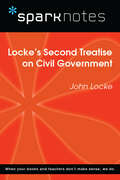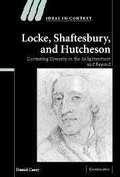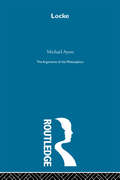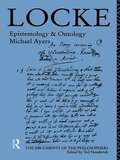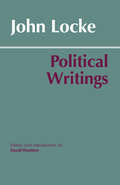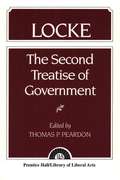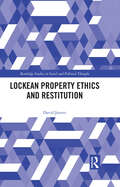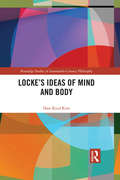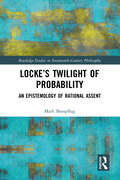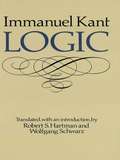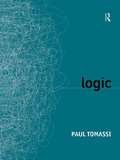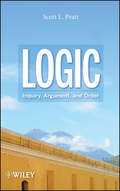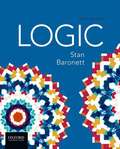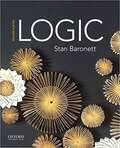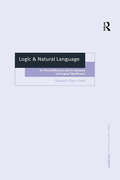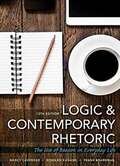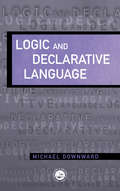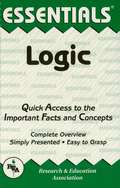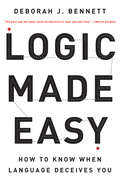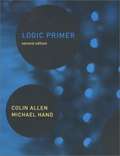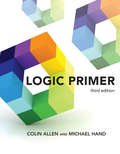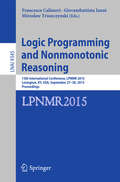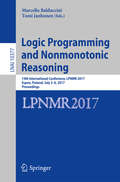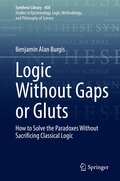- Table View
- List View
Locke's Second Treatise on Civil Government (SparkNotes Philosophy Guide)
by SparkNotesLocke's Second Treatise on Civil Government (SparkNotes Philosophy Guide) Making the reading experience fun! SparkNotes Philosophy Guides are one-stop guides to the great works of philosophy–masterpieces that stand at the foundations of Western thought. Inside each Philosophy Guide you&’ll find insightful overviews of great philosophical works of the Western world.
Locke, Science, and Politics
by Steven FordeIn this groundbreaking book, Steven Forde argues that John Locke's devotion to modern science deeply shaped his moral and political philosophy. Beginning with an account of the classical approach to natural and moral philosophy, and of the medieval scholasticism that took these forward into early modernity, Forde explores why the modern scientific project of Francis Bacon, Pierre Gassendi, Robert Boyle and others required the rejection of the classical approach. Locke fully subscribed to this rejection, and took it upon himself to provide a foundation for a compatible morality and politics. Forde shows that Locke's theory of moral 'mixed modes' owes much to Pufendorf, and is tailored to accommodate science. The theory requires a divine legislator, which in turn makes natural law the foundation of morality, rather than individual natural right. Forde shows the ways that Locke's approach modified his individualism, and colored his philosophy of property, politics and education.
Locke, Shaftesbury, and Hutcheson: Contesting Diversity in the Enlightenment and Beyond
by Daniel CareyAre human beings linked by a common nature, or are they fragmented by different cultural practices and values? These fundamental moral questions were debated in the Enlightenment by Locke, Shaftesbury, and Hutcheson. Daniel Carey explores the relationship between these founding arguments and contemporary disputes over cultural diversity and multiculturalism.
Locke-Arg Philosophers (Arguments Of The Philosophers Ser. #12)
by Michael AyersFirst published in 1999. Routledge is an imprint of Taylor & Francis, an informa company.
Locke: Epistemology and Ontology
by Michael AyersJohn Locke is the greatest English philosopher. An Essay Concerning Human Understanding, one of the most influential books in the history of thought, is his greatest work. In this study the historical meaning and philosophical significance of Locke's Essay are investigated more comprehensively than ever before. Locke was originally published in two volumes, Epistemology and Ontology. This paperback edition has within its covers the full text of both volumes.
Locke: Political Writings
by John Locke David WoottonJohn Locke's Second Treatise of Government (c. 1681) is perhaps the key founding liberal text. A Letter Concerning Toleration, written in 1685 (a year when a Catholic monarch came to the throne of England and Louis XVI unleashed a reign of terror against Protestants in France), is a classic defense of religious freedom. Yet many of Locke's other writings--not least the Constitutions of Carolina, which he helped draft--are almost defiantly anti-liberal in outlook.This comprehensive collection brings together the main published works (excluding polemical attacks on other people's views) with the most important surviving evidence from among Locke's papers relating to his political philosophy. David Wootton's wide-ranging and scholarly Introduction sets the writings in the context of their time, examines Locke's developing ideas and unorthodox Christianity, and analyzes his main arguments. The result is the first fully rounded picture of Locke's political thought in his own words.
Lockean Property Ethics and Restitution (Routledge Studies in Social and Political Thought)
by David JarrettIn this book, David Jarrett argues that the influential Lockean thesis of justice in property, which traces back to John Locke, seems to entail much egalitarian property redistribution. Put briefly, Lockeans argue that people justly own: (1) any unowned natural resources they labour on, (2) any resources they receive via voluntary transfer from a legitimate owner, and (3) any resources they legitimately receive in compensation for harm done to their person or legitimately held property. However, a question that has been largely overlooked by Lockeans is how to address the problem of property which did not arise in line with Lockean justice. What do we do about property which derives from feudal and colonial conquest, for example? Drawing on a range of theoretical and historical sources, this book argues that the legal concept of restitution is the most reasonable way to address the problem. If we apply this concept, it appears that much property in the world is held unjustly and should be redistributed in an egalitarian manner. Lockean Property Ethics and Restitution will be of interest to political theorists and philosophers alike.
Locke’s Ideas of Mind and Body (Routledge Studies in Seventeenth-Century Philosophy)
by Han-Kyul KimThis book begins with a survey of various readings of Locke as a materialist, as a substance dualist, and as a property dualist, and demonstrates that these inconsistent interpretations result from a general failure of modern commentators to notice the significance of Locke’s ‘mind-body nominalism’. By illuminating this largely overlooked aspect of Locke’s philosophy, this book reveals a common mistake of previous interpretations: that of treating what Locke conceives to be ‘nominal’ as real. The nominal symmetry that Locke posits between mind and body is distinct from any form of metaphysical dualism, whether substance dualism or property dualism. It is a brand of naturalism, but does not insist that the material is ontologically more basic than the mental or that the former determines the latter. On this view, the material and the mental both relate solely to a certain set of functional roles, rather than to an intrinsic property that plays these roles. The term ‘matter’ is thus rendered vague, and materialism is conceived as a precariously grounded ontological doctrine. Elaborating on this interpretation of Locke’s Essay, this book examines the insightful readings of Locke developed by seventeenth- and eighteenth-century thinkers such as Richard Burthogge, William Carroll, and Joseph Priestley. This book also seeks to clarify what Locke’s position would look like in a modern setting by noting some significant parallels with the ideas of leading contemporary philosophers such as Donald Davidson, David Lewis, and Colin McGinn.
Locke’s Twilight of Probability: An Epistemology of Rational Assent (Routledge Studies in Seventeenth-Century Philosophy)
by Mark BoespflugThis book provides a systematic treatment of Locke’s theory of probable assent and shows how the theory applies to Locke’s philosophy of science, moral epistemology, and religious epistemology. There is a powerful case to be made that the most important dimension of Locke’s philosophy is his theory of rational probable assent, rather than his theory of knowledge. According to Locke, we largely live our lives in the “twilight of probability” rather than in “the sunshine of certain knowledge.” Locke’s theory of probable assent has far-reaching significance insofar as it contains a wealth of novel, independently interesting, and prescient elements that precede the modern field of formal epistemology. In this book, the author argues for the central role of probable assent in Locke’s philosophy. Locke’s theory of probable assent is based on an epistemic modesty that claims, roughly, that our cognitive abilities are limited and that we ought to carry ourselves in believing with due caution. This modesty motivates the author’s discussion of other aspects of Locke’s epistemology, notably his principle of proportionality, his doxastic involuntarism, his epistemological pragmatism, and his theory of testimony. The book concludes by connecting the theory of probable assent with Locke’s views on the limits of science, moral epistemology, and the rationality of faith. Locke’s Twilight of Probability will appeal to scholars and advanced students working on Locke and the history of early modern philosophy.
Logic
by Immanuel KantThe second, corrected edition of the first and only complete English translation of Kant's highly influential introduction to philosophy, presenting both the terminological and structural basis for his philosophical system, and offering an invaluable key to his main works, particularly the three Critiques. Extensive editiorial apparatus.
Logic
by Paul TomassiBringing elementary logic out of the academic darkness into the light of day, Paul Tomassi makes logic fully accessible for anyone attempting to come to grips with the complexities of this challenging subject. Including student-friendly exercises, illustrations, summaries and a glossary of terms, Logic introduces and explains: * The Theory of Validity* The Language of Propositional Logic* Proof-Theory for Propositional Logic* Formal Semantics for Propositional Logic including the Truth-Tree Method* The Language of Quantificational Logic including the Theory of Descriptions. Logic is an ideal textbook for any logic student: perfect for revision, staying on top of coursework or for anyone wanting to learn about the subject. Related downloadable software for Macs and PCs is available for this title at www.logic.routledge.com.
Logic
by Scott L. PrattAn enlightening introduction to the study of logic: its history, philosophical foundations, and formal structuresLogic: Inquiry, Argument, and Order is the first book of its kind to frame the study of introductory logic in terms of problems connected to wider issues of knowledge and judgment that arise in the context of racial, cultural, and religious diversity. With its accessible style and integration of philosophical inquiry and real-life concerns, this book offers a novel approach to the theory of logic and its relevance to questions of meaning and value that arise in the world around us.The book poses four problems for logic: Is logic separate from experience? Does logic require dualisms? Can logic reconcile opposed ways of understanding the world? And when things are divided, does the boundary have a logic? The author begins the exploration of these questions with a discussion of the process of analyzing and constructing arguments. Using the logical theories of C. S. Peirce, John Dewey, and Josiah Royce to frame the investigation, subsequent chapters outline the process of inquiry, the concept of communicative action, the nature of validity, categorical reasoning through the theory of the syllogism, and inductive reasoning and probability. The book concludes with a presentation of modal logic, propositional logic, and quantification.Logic is presented as emerging from the activities of inquiry and communication, allowing readers to understand even the most difficult aspects of formal logic as straightforward developments of the process of anticipating and taking action. Numerous practice problems use arguments related to issues of diversity and social theory, and the book introduces methods of proving validity that include Venn diagrams, natural deduction, and the method of tableaux.Logic: Inquiry, Argument, and Order is an ideal book for courses on philosophical methods and critical reasoning at the upper-undergraduate and graduate levels. It is also an insightful reference for anyone who would like to explore a cross-cultural approach to the topic of logic.
Logic
by Stan BaronettA comprehensive and student-friendly introduction, Logic demonstrates the relevance of logic and critical reasoning in everyday life. Featuring an exceptionally clear writing style and a wealth of real-world examples and exercises, this text shows the applications of logic in such areas as theworkplace, media and entertainment, politics, science and technology, and student life.
Logic
by Stan BaronettFeaturing an exceptionally clear writing style and a wealth of real-world examples and exercises, Logic, Fourth Edition, shows how logic relates to everyday life, demonstrating its applications in such areas as the workplace, media and entertainment, politics, science and technology, student life, and elsewhere. The examples and exercises were chosen to be interesting, thought-provoking, and relevant to students. <P><P> The text is enhanced by Dashboard, Oxford University Press' learning management platform, which offers a wealth of learning resources, including interactive proof-checking and truth table exercises. The fourth edition features new illustrations in Chapter 1; clearer treatments of existential import and the traditional square of opposition in Chapter 5; and a new appendix, "The LSAT and Logical Reasoning."
Logic & Natural Language: On Plural Reference and Its Semantic and Logical Significance (Ashgate New Critical Thinking in Philosophy)
by Hanoch Ben-YamiFrege's invention of the predicate calculus has been the most influential event in the history of modern logic. The calculus’ place in logic is so central that many philosophers think, in fact, of it when they think of logic. This book challenges the position in contemporary logic and philosophy of language of the predicate calculus claiming that it is based on mistaken assumptions. Ben-Yami shows that the predicate calculus is different from natural language in its fundamental semantic characteristics, primarily in its treatment of reference and quantification, and that as a result the calculus is inadequate for the analysis of the semantics and logic of natural language. Ben-Yami develops both an alternative analysis of the semantics of natural language and an alternative deductive system comparable in its deductive power to first order predicate calculus but more adequate than it for the representation of the logic of natural language. Ben-Yami's book is a revolutionary challenge to classical first order predicate calculus, casting doubt on many of the central claims of modern logic.
Logic And Contemporary Rhetoric: The Use Of Reason In Everyday Life (Mindtap Course List Ser.)
by Frank Boardman Nancy M. Cavender Howard KahaneLOGIC AND CONTEMPORARY RHETORIC: THE USE OF REASON IN EVERYDAY LIFE, 13th Edition, introduces you to sound reasoning using current, relevant, and stimulating examples in a witty and invigorating writing style. Combining examples from television, newspapers, magazines, advertisements, and our nation's political dialogue, this classic text brings the concepts to life and puts critical-thinking skills into a context that you will retain and use throughout your life.
Logic And Declarative Language
by M. DownwardLogic has acquired a reputation for difficulty, perhaps because many of the approaches adopted have been more suitable for mathematicians than computer scientists. This book shows that the subject is not inherently difficult and that the connections between logic and declarative language are straightforward. Many exercises have been included in the hope that these will lead to a much greater confidence in manual proofs, therefore leading to a greater confidence in automated proofs.
Logic Essentials
by W. Kent WilsonREA's Essentials provide quick and easy access to critical information in a variety of different fields, ranging from the most basic to the most advanced. As its name implies, these concise, comprehensive study guides summarize the essentials of the field covered. Essentials are helpful when preparing for exams, doing homework and will remain a lasting reference source for students, teachers, and professionals. Logic covers the basic concepts of logic, including sentences, arguments, and the evaluation of arguments. This book will give the reader a clear understanding of sentence logic such as symbolization, semantics, and truth trees by giving concise definitions and examples of each.
Logic Made Easy: How to Know When Language Deceives You
by Deborah J. Bennett"The best introduction to logic you will find."--Martin Gardner "Professor Bennett entertains as she instructs," writes Publishers Weekly about the penetrating yet practical Logic Made Easy. This brilliantly clear and gratifyingly concise treatment of the ancient Greek discipline identifies the illogical in everything from street signs to tax forms. Complete with puzzles you can try yourself, Logic Made Easy invites readers to identify and ultimately remedy logical slips in everyday life. Designed with dozens of visual examples, the book guides you through those hair-raising times when logic is at odds with our language and common sense. Logic Made Easy is indeed one of those rare books that will actually make you a more logical human being.
Logic Primer
by Colin Allen Michael Hand<P>Logic Primer presents a rigorous introduction to natural deduction systems of sentential and first-order logic.<P> The text is designed to foster the student-instructor relationship. <P>The key concepts are laid out in concise definitions and comments, with the expectation that the instructor will elaborate upon them. <P>New to the second edition is the addition of material on the logic of identity in chapters 3 and 4.<P> An innovative interactive Web site, consisting of a "Logic Daemon" and a "Quizmaster," encourages students to formulate their own proofs and links them to appropriate explanations in the book.
Logic Primer, third edition
by Colin Allen Michael HandThe new edition of a comprehensive and rigorous but concise introduction to symbolic logic.Logic Primer offers a comprehensive and rigorous introduction to symbolic logic, providing concise definitions of key concepts, illustrative examples, and exercises. After presenting the definitions of validity and soundness, the book goes on to introduce a formal language, proof theory, and formal semantics for sentential logic (chapters 1–3) and for first-order predicate logic (chapters 4–6) with identity (chapter 7). For this third edition, the material has been reorganized from four chapters into seven, increasing the modularity of the text and enabling teachers to choose alternative paths through the book. New exercises have been added, and all exercises are now arranged to support students moving from easier to harder problems. Its spare and elegant treatment makes Logic Primer unique among textbooks. It presents the material with minimal chattiness, allowing students to proceed more directly from topic to topic and leaving instructors free to cover the subject matter in the way that best suits their students. The book includes more than thirty exercise sets, with answers to many of them provided in an appendix. The book&’s website allows students to enter and check proofs, truth tables, and other exercises interactively.
Logic Programming and Nonmonotonic Reasoning
by Francesco Calimeri Giovambattista Ianni Miroslaw TruszczynskiThis volume contains the refereed proceedings of the 13th International Conference on Logic Programming and Nonmonotonic Reasoning, LPNMR 2015, held in September 2015 in Lexington, KY, USA. The 290long and 11 short papers presented together with 3 invited talks, the paper reporting on the Answer Set Programming competition, and four papers presented by LPNMR student attendees at the doctoral consortium were carefully reviewed and selected from 60 submissions. LPNMR is a forum for exchanging ideas on declarative logic programming, nonmonotonic reasoning, and knowledge representation. The aim of the LPNMR conferences is to facilitate interactions between researchers interested in the design and implementation of logic-based programming languages and database systems, and researchers who work in the areas of knowledge representation and nonmonotonic reasoning.
Logic Programming and Nonmonotonic Reasoning
by Marcello Balduccini Tomi JanhunenThis Festschrift volume, published in honor of Michael Gelfond on the occasion of his 65th birthday, contains a collection of papers written by his closest friends and colleagues. Several of these papers were presented during the Symposium on Constructive Mathematics in Computer Science, held in Lexington, KY, USA on October 25-26, 2010. The 27 scientific papers included in the book focus on answer set programming. The papers are organized in sections named "Foundations: ASP and Theories of LP, KR, and NMR", "ASP and Dynamic Domains", and "ASP - Applications and Tools".
Logic Without Gaps or Gluts: How to Solve the Paradoxes Without Sacrificing Classical Logic (Synthese Library #458)
by Benjamin Alan BurgisThis book offers a defense against non-classical approaches to the paradoxes. The author argues that, despite appearances, the paradoxes give no reason at all to reject classical logic. In fact, he believes classical solutions fare better than non-classical ones with respect to key tests like Curry’s Paradox, a Liar-like paradox that dialetheists are forced to solve in a way totally disjoint from their solution to the Liar. Graham Priest’s In Contradiction was the first major work that advocated the use of non-classical approaches. Since then, these views have moved into the philosophical mainstream. Much of this movement is fueled by a widespread sense that these logically heterodox solutions get to the real nub of the issue. They lack the ad hoc feel of many other solutions to the paradoxes. The author believes that it's long past time for a response to these attacks against classical orthodoxy. He presents a non-logically-revisionary solution to the paradoxes. This title offers a literal way of cashing out the disquotation metaphor. While the details of the view are novel, the idea has a pre-history in the relevant literature. The author examines objections in detail. He rejects each in turn and concludes by comparing the virtues of his logically orthodox approach with those of the paraconsistent and paracomplete competition.
